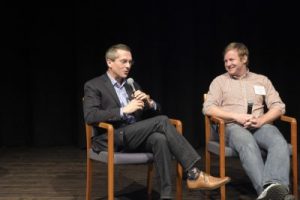Harvard Startup HourlyNerd Taps $22M as World of Work Evolves

The global workforce is in the early stages of a shift away from traditional 9-to-5 office jobs and toward more flexible freelance work, thanks to new technologies and preferences among younger workers.
The question is what a typical career will look like when the dust settles in the next decade or so. Will full-time jobs with a single employer be eradicated, as people stitch together a living performing solely project-based work?
Patrick Petitti, co-CEO and co-founder of HourlyNerd, thinks full-time jobs will always exist. But he argues that in the near term, most people will go through career phases in which they toggle between working for one company and working for many as a freelancer.
His startup—whose software helps people with MBAs and other business expertise find work consulting for companies big and small—is one of the emerging firms enabling workers to have that choice. Some related companies include London-based MBA & Company and, for tasks like Web design and app development, Upwork of Mountain View, CA.
“Today, work dictates the most important decisions in your life,” Petitti says, such as where to live. But technologies like HourlyNerd’s platform, he says, allow people to make a living choosing which projects they want to take, and working wherever and whenever they want. “We think that’s how people are going to work in the future. There certainly is space to be a full-time employee, but it should be your choice.”
The vision for HourlyNerd got a big boost today with a $ 22 million Series C investment led by General Catalyst Partners, with contributions from Highland Capital Partners, GE Ventures, Dallas Mavericks owner Mark Cuban, Greylock Partners, and Bob Doris of Accanto Partners. That brings HourlyNerd’s total venture capital haul to more than $ 33 million since it was founded in 2013 by four Harvard MBA students.
The Boston-based company has grown to 68 employees, and plans to reach 100 or so by the end of the year, says co-founder and co-CEO Rob Biederman. It will primarily plow the new funding into product development and sales and marketing, he adds.
HourlyNerd initially went after small and medium-sized businesses. The idea was that such firms could quickly and relatively cheaply hire an expert freelancer to tackle a task for which they lacked expertise or resources, like creating a social media marketing campaign or drawing up a detailed business plan. HourlyNerd set up an online marketplace through which freelancers could bid on projects, and afterward get paid and rated for their work.
In recent months, the company has begun catering to more big businesses as well, with its global network of “nerds” tackling more complex projects on an individual basis or with a team of expert consultants. These jobs might involve helping a client understand the impact and opportunities associated with the so-called Internet of Things, or figuring out the best way for a company to repatriate cash held overseas, Biederman says. In a recent example, a large American casual dining restaurant chain (he wouldn’t disclose the name) tapped HourlyNerd to help it rethink its cuisine, he says.
“These are projects that are critically important to an enterprise’s long-term success,” Biederman says.

HourlyNerd’s Pat Petitti (right) shares a laugh with Neal Sandy from GE Ventures at Xconomy’s Influx event. Photo by Keith Spiro Photography.
Petitti says the restaurant example is “emblematic” of how executives of large enterprises these days need to be agile and stay abreast of threats to their businesses. “To do that well, you probably don’t want to be leveraging the internal people you’ve built up,” who are “biased” toward the company’s existing approach, Petitti says.
HourlyNerd says it has grown to a global network of 25,000 business experts offering their services to 5,000 companies around the world, including almost 10 percent of Fortune 1000 companies. The startup’s big clients include GE and Pfizer. Serving large enterprises puts HourlyNerd into more direct competition with big consulting firms like Bain, Boston Consulting Group, and McKinsey, although Petitti says enterprises might use both HourlyNerd and traditional consulting firms, depending on the project or need.
HourlyNerd says large enterprises are starting to recognize that even though their companies are structured in basically the same way they have been for decades, there are opportunities for them to adapt to new technologies and ways of getting work done. They’re starting to see “all the global brain—all the resources across the world—as resources to them,” Petitti says.
(24)


